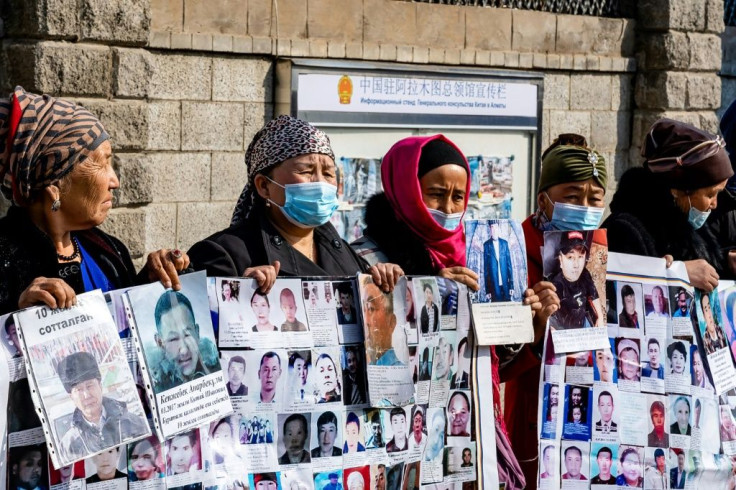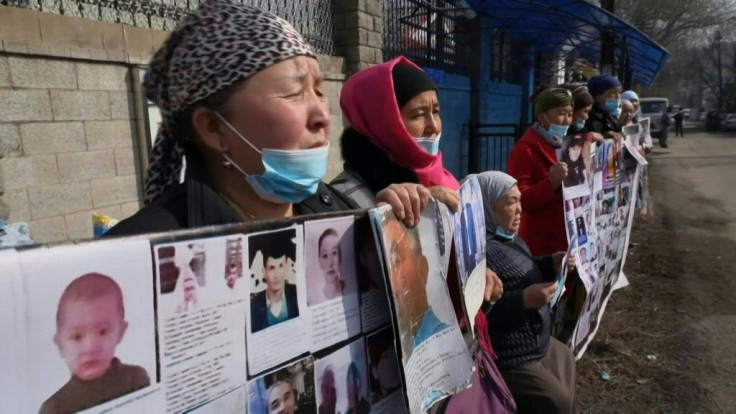Kazakhs Take Xinjiang Protest To China's Doorstep
Gulnur Kosdaulet's daily journey to protest over her husband's detention in China begins with a shared taxi that she hails outside her modest farm, where towering mountains give way to Kazakhstan's vast steppe.
An hour and a half later she arrives at Beijing's consulate in the Central Asian country's largest city Almaty, where a small picket has persisted for over a month despite police intimidation.
The demands of the mostly female demonstrators are simple: safe passage home for their relatives -- who are missing, jailed or trapped in China's crackdown on minorities in the northwestern Xinjiang region.

Kosdaulet, 48, told AFP that she would have "sat quietly by the hearth and never given politics a thought" had her husband, who is a Chinese citizen, returned from a funeral he attended in Xinjiang 2017.
She says he was detained simply for having WhatsApp on his phone and although he has now been freed after stints in jail and "training facilities", his passport has been seized and he cannot leave China.
"Kazakhstan and China are friendly. We hold these protests hoping the two governments will find common ground and return our people," she said.
In recent years, majority-Muslim Xinjiang has become known the world over for China's network of detention camps.

Dozens of international experts in a report for the Newlines Institute think tank said this month that Chinese policies there violated "each and every act" prohibited by the United Nations Genocide Convention.
So far, only the United States has accused China of genocide but the Dutch and Canadian parliaments have both passed votes calling on their governments to follow suit.

But Beijing says its actions are needed to combat extremism, with foreign Minister Wang Yi calling allegations of genocide "preposterous".
Nowhere is the tension between these competing narratives more keenly felt than Kazakhstan.
While Kazakhs are concerned over the fate of thousands of their relatives trapped in China, their government relies on Beijing for investments to bolster a flagging economy.

Every morning that the protest outside the Chinese consulate starts up, so too does a police loudspeaker.
The message repeated on loop warns protesters their actions are illegal and they could face prosecution.
"They wanted to drown us out," said Baibolat Kunbolat, a 40-year-old man whose brother was jailed in Xinjiang in 2018 on charges of extremism that he believes are trumped up.

Kunbolat last month became the second person to be imprisoned over the consulate pickets. He served a 12-day sentence but joined the protests again shortly after.
At one point, after leading a chorus of "freedom", a woman standing next to Kosdaulet holding two photographs broke down in tears.
"I am looking for my husband Zharkynbek," said the woman, Tursyngul Nurakai. "He disappeared four years ago. This is my nephew Kenzhebek. He was sentenced to 10 years in jail."
Most of the protesters have filed appeals with the government to engage with Beijing over their relatives -- Chinese citizens who in some cases held Kazakh residency permits.
But the demonstrators stress that they now see the pickets as their only hope and many say their government has given up trying to get their loved ones back.
At the end of 2018, Kazakhstan's foreign ministry said China had allowed 2,000 ethnic Kazakhs to enter Kazakhstan as a "kind gesture".
But since the releases, news that other relatives had received jail sentences -- sometimes after stints in high-security facilities that China has likened to vocational training centres -- has become far more common.
Kosdaulet's husband Akbar, a 47-year-old veterinarian and former provincial official, has now been separated from his family for three years.
Kosdaulet told AFP he can now contact her, but cannot return to Kazakhstan, where the family moved in 2014.
The mother of three travelled to China four times to bring him back, meeting him once through a glass barrier.
She was spared detention herself, she believes, because of her Kazakh passport. On each visit, surveillance grew tighter.
"The last time I went, in 2018, I was trailed by a police car everywhere I went," she said.
When the protests at the Chinese consulate began in February, Kosdaulet brought along her mother-in-law, Sarkytkhan Kydyrbay.
But after a few protests the journey became too much for the stocky 74-year-old, who is doubled up with joint pain and "going blind from tears", Kosdaulet said.
"I've lived my life. I just want to see him, kiss him. Then I can die," she said.
© Copyright AFP 2024. All rights reserved.




















